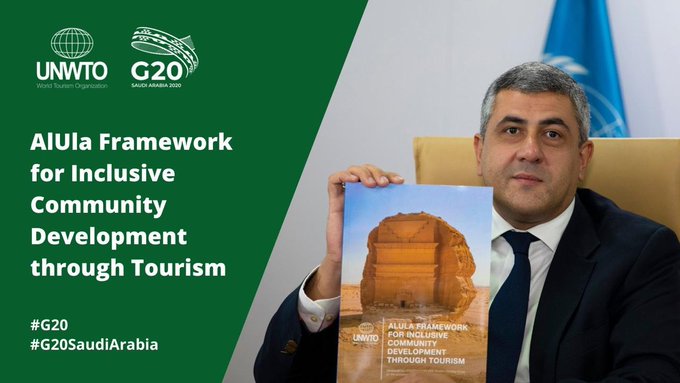
Unwto: Framework For Inclusive Community Development Through Tourism Named For Alula
The World Tourism Organization (UNWTO) has named the Framework and Guidelines for Inclusive Community Development through Tourism as AlUla Framework for Inclusive Community Development through Tourism. This step emanates from the support provided by His Royal Highness Prince Mohammed bin Salman bin Abdulaziz Al Saud, Crown Prince and Chairman of the Board of Directors of the Royal Commission for AlUla as well as the tourism sector and its pivotal role in supporting the sustainable development and the local economy, affirming the Kingdom's commitment to intensify efforts for the sustainable development of the travel and tourism sector, in line with the 2030 Sustainable Development Plan.
This came as one of the outcomes of the meeting of the G20 Tourism Ministers, under the Kingdom of Saudi Arabia's G20 presidency to address the challenges in light of the novel Coronavirus (COVID-19). It also comes to revive the travel and tourism sector in order to push the wheel of economic recovery following the repercussions of the crisis, to promote the sector's contributions to the comprehensive and sustainable development and to develop the sector as a major and strong contributor to the global economy.
It is worth mentioning that the final communique of G20 Tourism Ministers meeting encouraged the use of the AlUla Framework for Inclusive Community Development Through Tourism, which can serve as a guide for countries to work to ensure that tourism contributes to sustainable and inclusive development through the identifying and supporting communities with high tourism potential; defining potential areas of action and respective stakeholders that promote local development, in addition to the progress towards evidence-based policies founded on the measurement of the sustainability of tourism in line with international standards, and showcasing good practices in the sector.
The G20 Tourism Ministers also highlighted the crucial role of tourism as a means of sustainable socio-economic development. The travel and tourism sector contributed to 10.3% of the world’s Gross Domestic Product (GDP) and 330 million jobs (direct, indirect, and induced) in 2019. It accounted for 28% of the world’s service exports in 2019, and it generates a greater impact on domestic economies than overall exports.


























